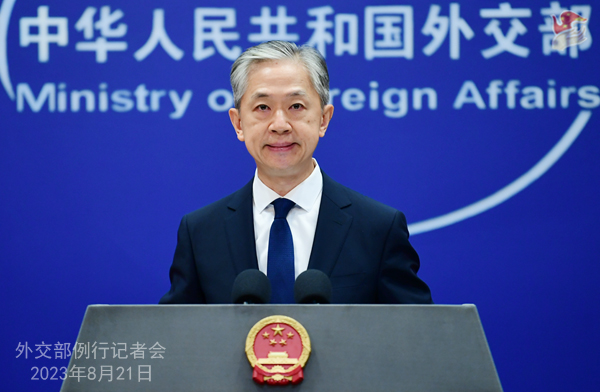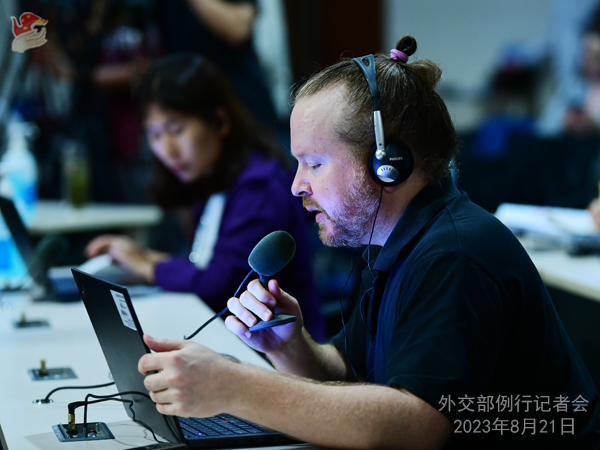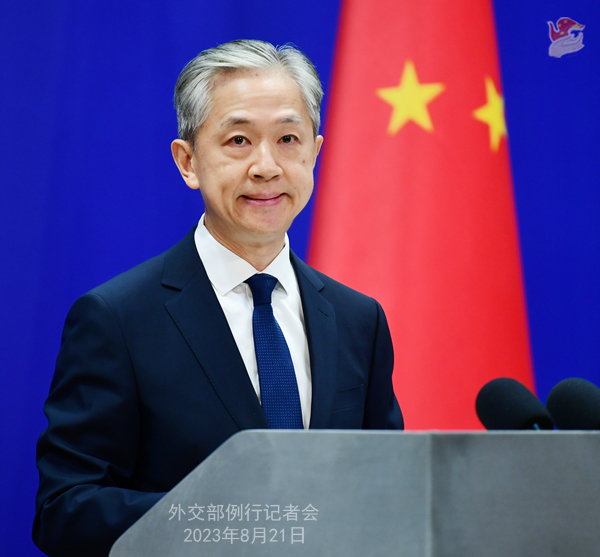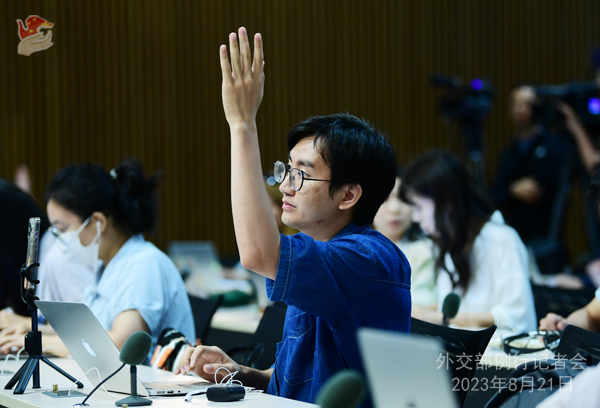| Foreign Ministry Spokesperson Wang Wenbin’s Regular Press Conference on August 21, 2023 |
| 2023-08-21 20:26 |
|
China Daily: On August 18, Member of the Political Bureau of the CPC Central Committee and Minister of Foreign Affairs Wang Yi and Minister for Foreign Affairs of Denmark Lars Løkke Rasmussen who was visiting China jointly issued the Green Joint Work Programme Between Governments of China and Denmark for 2023-2026. How will the programme help promote the China-Denmark relationship? Wang Wenbin: Minister for Foreign Affairs of Denmark Lars Løkke Rasmussen paid an official visit to China from August 16 to 19. During the visit, Vice President Han Zheng met with him and Member of the Political Bureau of the CPC Central Committee and Minister of Foreign Affairs Wang Yi held talks with him. The two foreign ministers jointly launched the Green Joint Work Programme Between Governments of China and Denmark for 2023-2026. Practical cooperation between China and Denmark enjoys a good foundation and enormous potentials. The China-Denmark Joint Work Programme (2017-2020) released in 2017 by the two governments has been soundly put into practice and played a positive role in promoting the practical cooperation between the two sides. Based on the new work programme, the two countries will further enhance and deepen bilateral cooperation under the comprehensive strategic partnership and expand green cooperation in such fields as environment, water resources, science and education, agriculture and food, maritime affairs, tourism and health. The new practice in China-Denmark green cooperation of launching this work programme elevated practical cooperation between the two countries to new heights, further enriched the China-Denmark comprehensive strategic partnership and will provide impetus for China-Europe and even international green cooperation. China stands ready to work with Denmark to make new and greater contribution to achieving stronger, greener and healthier global development and realizing the 2030 Agenda for Sustainable Development. Bloomberg: Japan, Korea and the US in a joint statement over the weekend criticized the “dangerous and aggressive behavior supporting unlawful maritime claims that we have recently witnessed by the People’s Republic of China (PRC) in the South China Sea.” They also affirmed the importance of peace and stability across the Taiwan Strait as an indispensable element of security and prosperity in the international community. What is your response to this? Wang Wenbin: The trilateral summit of leaders of the US, Japan and the ROK at Camp David smeared and attacked China on Taiwan and maritime issues—an act of gross interference in China’s internal affairs, a deliberate attempt to sow discord between China and our neighbors and a serious violation of norms in international relations. China deplores and strongly opposes this and has made solemn démarches to relevant parties. We have also noted that the US says the trilateral partnership is not against anyone. We urge it to match its words with actions and act on its statement that the revitalization of its alliances is not targeted at China, stop smearing China’s image and harming China’s interests, and stop creating division and confrontation and undermining regional peace and stability. We see two trajectories in the Asia-Pacific today. One features efforts to advance solidarity, cooperation and economic integration. The Regional Comprehensive Economic Partnership (RCEP) and the Comprehensive and Progressive Agreement for Trans-Pacific Partnership (CPTPP) are two examples. The other features attempts to stoke division and confrontation and revive the Cold War mentality. Examples include exclusionary groupings such as AUKUS, the US-Japan-ROK partnership and Quad, to name just a few. Regrettably, the US has been missing in the former and all examples in the latter are centered around Washington DC. The Asia-Pacific region is a promising land for peace and development. It should not be turned into a boxing ring for major power rivalry, still less a battlefield of a cold war or hot war. Attempts to stoke a new Cold War in the region will be met by firm rejection of regional countries and peoples. Those who seek to establish and maintain hegemony in the region are doomed to fail. We urge relevant countries not to go against the trend of the times, stop replicating the bloc confrontation elsewhere in this region, and stop pursuing selfish gains at the expense of other countries’ strategic and security interests and the wellbeing of people in Asia-Pacific. The Taiwan question is purely China’s internal affair. Resolving it is a matter for the Chinese. We strive for peaceful reunification with the greatest sincerity and the utmost effort, but we will never allow interference in China’s internal affairs using “peace” as a false pretext by anyone or any force. The greatest threat to cross-Strait peace is “Taiwan independence” forces and foreign connivance and support for their activities. If relevant countries do care about peace and stability in the Taiwan Strait, they need to abide by the one-China principle, stop conniving at or supporting “Taiwan independence” separatist forces and their activities, and protect regional peace and stability through concrete action. No one should underestimate the determination, resolve and capability of the Chinese people in safeguarding China’s sovereignty and territorial integrity. China has indisputable sovereignty over the Nanhai Zhudao (islands in the South China Sea) and the adjacent waters. China’s construction on its own territory and China Coast Guard’s action to protect China’s rights and enforce the laws in waters under China’s jurisdiction are legitimate, lawful and beyond reproach. As a state party to the United Nations Convention on the Law of the Sea (UNCLOS), China always abides by international law including UNCLOS and does not accept or recognize the illegal arbitral award on the South China Sea. In recent years, the US has gone to great lengths to interfere in the South China Sea issue. It has encouraged and supported certain countries’ violation of other countries’ maritime rights and sowed discord between countries in the region, which makes the US a disrupter and saboteur of the regional order. The US, together with its allies, frequently conducted military exercises and close-in reconnaissance in waters around China, including the South China Sea, to flex muscles and intensify tensions in the region. The US has become the biggest threat and challenge to regional peace and stability. China will continue to firmly defend its sovereignty and security interests, work with ASEAN countries to fully and effectively implement the DOC, promote steady progress in COC consultations, carry out practical maritime cooperation, and firmly uphold peace and stability and boost development in the region.
China News Service: Keith Rockwell, a former chief spokesman at the World Trade Organization, reportedly said recently that under the Belt and Road Initiative, China had funded mega infrastructure projects in Africa and that China’s relations with Africa were broad and deep and likely to remain strong for many years. What’s your comment? Wang Wenbin: We have noted the article. China is committed to advancing solidarity and cooperation with Africa under the principles of sincerity, real results, affinity and good faith and pursuing the greater good and shared interests. We stand together with the African people and pursue common development with African countries on the basis of mutual respect. Since the Belt and Road Initiative (BRI) was launched a decade ago, African countries have actively supported and participated in high-quality cooperation under the framework. With steady progress in a host of major projects, the BRI has given a strong boost to the economic and social development in African countries. The Mombasa-Nairobi Railway, which started operation six years ago, has shipped a total of 10.3 million passengers and 27 million tonnes of cargo, adding 1.5 percentage points to Kenya’s GDP growth. The Addis Ababa-Djibouti Railway, which started operation five years ago, has greatly facilitated the flow of people and goods among Ethiopia, Djibouti and other regional countries. During the COVID-19 pandemic, these two railways saw their capacity increase and served as the main arteries in the region, which contributed to fighting the pandemic, ensuring people’s wellbeing, and revitalizing the economy. The No.1 National Highway in the Republic of the Congo, which links the country’s only sea port Pointe-Noire with the capital and the hinterland, has been hailed by the Congolese President as a road of dreams and a road to the future. China Longyuan Electric Power’s De Aar Wind Power Project in South Africa saves 215,800 tonnes of standard coal units and reduces carbon dioxide emissions by 619,900 tonnes per year, and provides electricity to 300,000 local households. It empowers South Africa’s green and low-carbon development and demonstrates a feasible path for green BRI cooperation. The Kafue Gorge Lower Hydropower Project, the largest infrastructure project in Zambia in nearly 40 years, reduces carbon emissions by 663,500 tonnes per year and generates more than USD 1 million in revenues per day. Nigeria’s Lekki Deep Sea Port has played an important role in enhancing its entrepot trade capacity and promoting connectivity in western Africa. The headquarters of the Africa Centres for Disease Control and Prevention, the first on the continent to be fully equipped with modern office and lab facilities, have become a new landmark of Africa integration. On the basis of respecting the will of the African people and African countries’ needs, China will continue to help Africa with no political strings attached, work for a strong synergy between the BRI and Agenda 2063 of the African Union, the 2030 Agenda for Sustainable Development of the UN, as well as the development strategies of African countries, support Africa in accelerating integration and connectivity, and bring more benefits to the Chinese and African people. Asahi TV: Japanese media reported that China and Russia once asked the Japanese government to explore disposing of the Fukushima nuclear-contaminated water through vapor release. Can you confirm this? Wang Wenbin: China has pointed out on many occasions that ocean discharge is not the safest or most prudent option to dispose of the nuclear-contaminated water. Japan simply chose it to lower economic costs. This will pose unnecessary risks to neighboring countries and the rest of the world. Japan needs to take seriously the legitimate concerns of the international community, have full communication with stakeholders including neighboring countries, stop pushing through the ocean discharge plan, study other options of disposal, and handle the nuclear-contaminated water in a responsible manner. Ukrinform News Agency: The British newspaper The Telegraph claims that China is helping to arm Russia with helicopters, drones and metals since the full-scale Russian invasion of Ukraine began. In particular, Russian arms companies have received tens of thousands of Chinese shipments for weapons production. How will the foreign ministry comment on this? Wang Wenbin: China carries out normal economic and trade cooperation with Russia and other countries on the basis of equality and mutual benefit. China handles export of military items in a prudent and responsible manner. China’s position and practice have been consistent and we oppose certain media outlets’ hyping-up and malicious smears. On the Ukraine issue, China is committed to promoting talks for peace and will continue to play a constructive role in seeking deescalation. China’s position is above board and stands in sharp contrast with the acts of certain countries who keep adding fuel to the fire. We believe the international community can see it as well.
CCTV: It was reported that when inspecting the Fukushima Daiichi nuclear power station on August 20, Japanese Prime Minister Fumio Kishida said that the “treated water” discharge “by no means can be postponed for the decomissioning and Fukushima’s recovery”. The reports also says that the Japanese government has basically decided to hold a meeting of cabinet ministers on August 22 to make the formal decision on when to begin discharging the water. What is your comment? Wang Wenbin: China has stated its serious position on multiple occasions on the Japanese government pushing through its plan of discharging the nuclear-contaminated water from the Fukushima Daiichi nuclear power station into the ocean. The Japanese government has been ignoring domestic and international opposition, questions about the legitimacy, legality and safety about the discharge plan, and the potential risks to the global marine environment and human health, and has been headstrong on dumping the nuclear-contaminated water into the ocean. This is extremely selfish and irresponsible. China expresses its grave concern and will closely follow the developments. Japan’s discharge plan has led to serious questions about the Japanese government’s credibility. In 2015, in a written document to the Fukushima Prefectural Federation of Fisheries Cooperative Association, the Japanese government pledged not to take any disposal action before having gained the understanding of the stakeholders. As of today, a large number of Japanese people, including the Fukushima Prefectural Federation of Fisheries Cooperative Association, are still strongly against the discharge plan. The latest survey by Kyodo News Agency on August 20 shows that 88.1 percent of the people being surveyed are concerned over the image damage and potential economic damage stemming from the discharge plan, and 81.9 percent think the government’s explanation is insufficient. The Japanese government, however, only said that it is necessary to respond to the fisheries’ concerns on an ongoing basis, as the release of the water will be a long-term effort. By going back on its own words, the Japanese government is jeopardizing its credibility with both its own people and the international community. Once the nuclear-contaminated water is released into the ocean, there is no way to recollect it. We urge Japan to take seriously the legitimate concerns of the Japanese people and the international community, stop making wrong decisions, and abort the ocean discharge plan. AFP: The first commercial flight of the DPRK’s Air Koryo from Pyongyang to Beijing after over three years of COVID-19, originally scheduled to arrive today, has been canceled. Are you aware of the reason? When will the DPRK border reopen to visitors? Wang Wenbin: After announcing the decision to manage COVID-19 with measures against Class-B infectious diseases, China, on January 8, 2023, resumed handling Chinese and foreign airlines’ applications to resume international passenger flights. In the process of shifting to the summer-autumn schedules of 2023, China approved in accordance with relevant procedures the DPRK’s Air Koryo’s application for scheduled Pyongyang-Beijing-Pyongyang flights. The airline undertakes the specific flights according to what has been approved by relevant Chinese authorities. This is what I have on that at the moment. Hubei Media Group: According to media reports, with 98 percent of the ballots counted in the second round of Guatemala’s presidential election, Bernardo Arevalo of the Seed Movement won 58.51 percent of the vote, 30 percentage points ahead of Sandra Torres of the National Union of Hope. How does China comment on the results? Does China intend to further develop relations with Guatemala? Wang Wenbin: Guatemala’s presidential election is its internal affair. I won’t comment on it. I would just stress again that the one-China principle is a universally recognized norm in international relations and a prevailing consensus among the international community. Establishing diplomatic ties with China is the right choice that accords with the trend of history and our times. Lately, people from various sectors in Guatemala have expressed in interviews their hope for Guatemala to establish diplomatic ties with China soon, which fully indicates that developing relations with China is what serves the fundamental interests of Guatemala and what the Guatemalan people want. We hope the new government of Guatemala will make the right call in line with the fundamental and long-term interests of its country and people.
Bloomberg: At Camp David this weekend, Japan, Korea and the US said they intend to operationalize their sharing of missile warning data on the DPRK in real-time by the end of 2023. Does China see this as breaking the “three noes” agreement with Korea from 2017 and how will China respond to this? Wang Wenbin: The parties concerned are obsessed with cobbling together exclusionary groupings. They’ve used the Korean Peninsula issues as a pretext to strengthen military cooperation and seek selfish geopolitical gains. This will only heighten the risk of bloc confrontation in the region, undermine the already fragile mutual trust among parties, and harm the strategic security interests of other countries. China urges relevant countries to abandon the Cold War mentality, face squarely the crux of the Korean Peninsula issues, stop engaging in confrontation and pressuring, address each other’s legitimate concerns in a balanced manner through meaningful dialogue, and maintain peace and stability on the Korean Peninsula. On the issue related to THAAD, I would like to say that the ROK is clear about China’s position and concerns, and the two sides have been in communication on this. We hope that the ROK will continue to properly handle the issue based on relevant common understandings between our two countries. CCTV: Bloomberg aired an interview with Lai Ching-te a few days ago, in which Lai propagated “Taiwan independence” fallacies. What is your comment? Wang Wenbin: Lai Ching-te’s propagation of “Taiwan independence” fallacies in a so-called “exclusive interview” at the time of his “stopovers” in the US reveals once again what kind of person he is—someone who has no qualms about betraying the interests of his nation to advance his selfish agenda and brazenly soliciting US support for “Taiwan independence”, and a stubborn, out-and-out “Taiwan independence” separatist and troublemaker. In the interview, Lai claimed that “Taiwan is already a sovereign, independent country”, “it is not necessary to declare independence”, Taiwan is “not part of the People’s Republic of China”, and the two “are not subordinate to one another”. They are sheer lies and blatant provocations. Just recently, Lai openly claimed his ultimate goal is for the leader of Taiwan to “walk into the White House”, which says enough about the extremely dangerous nature of Lai as a “Taiwan independence” separatist. There is only one China in the world, Taiwan is part of China—this has been so since ancient times. The historical context and legal facts to support that are crystal clear. Though the two sides of the Taiwan Strait are yet to be reunified, Taiwan’s status as part of China’s territory has never changed and must not change. China’s sovereignty over Taiwan has never changed and will not change. As of today, 182 countries in the world, including the US, have established diplomatic relations with China on the basis of the one-China principle. The US government has repeated time and again that it will not support “Taiwan independence”. How would Taiwan possibly have “sovereignty”? Taiwan has never been a country and will never be a country. Lai claimed that he hopes democratic countries will support Taiwan for its participation in international affairs so that Taiwan can better contribute to the international community. This is a familiar gimmick of using “seeking participation in international affairs” as a pretext to engage in political manipulation. Taiwan, as part of China, has no basis, reason or rights whatsoever to join an international organization whose membership requires statehood. The Chinese government had, however, based on the prerequisite of upholding the one-China principle, made proper arrangements for the Taiwan region’s participation in the World Health Assembly (WHA) and the ICAO Assembly. Yet the DPP authorities have been bent on pursuing “Taiwan independence” and refusing to accept the 1992 Consensus, which means the political foundation for Taiwan to take part in the WHA and other international activities no longer exists, and the relevant arrangements cannot continue as a result. The DPP authorities’ repeated manipulation of health, Covid response, aviation safety and other issues is never about caring for the wellbeing of the people in Taiwan, but about trying to expand “international space” and make “diplomatic” breakthroughs. How would that possibly “contribute” to the international community? During this year’s WHA, nearly 140 countries publicly supported China’s position, and the proposals about Taiwan were once again rejected. This once again shows that the one-China principle has overwhelming international support and represents the trend of the world. The DPP’s attempts to gain sympathy by playing the underdog and use “democracy” as a cover for its separatist activities are nothing but wishful thinking, and will only end in failure. What Lai has been doing—accusing the mainland of posing “threats”, creating a false impression of “international support” in the name of “democracy”, and roping relevant countries in to support “Taiwan independence” propositions—these are all familiar pages from DPP’s old playbook of hyping up antagonism to manipulate elections. Lai claimed that Taiwan will work closely with the international community to deepen “democracy” and that the US Congress will continue to support Taiwan. This is essentially to trick the international community into cheering for his campaign, and to play up to external forces so that they would support his separatist agenda. This is all theatrics staged by Lai Ching-te again to hug the US close and solicit its support for “Taiwan independence”. It lays bare Lai’s true identity as a “practical worker for Taiwanese independence”. Lai thought he could use “pragmatism”, “democracy” and “peace” as a cover to stop others from questioning his pursuit of “Taiwan independence”, but he can never truly hide his separatist agenda. What he does will only bring grave harm to peace and stability in the Taiwan Strait. It will only push Taiwan towards the danger of military conflict and lead our Taiwan compatriots to disaster. “Taiwan independence” is a dead end. Soliciting US support for “Taiwan independence” will lead nowhere for “Taiwan independence” separatists. We will work with the international community to firmly uphold the one-China principle, firmly safeguard our sovereignty and territorial integrity and firmly oppose the “Taiwan independence” separatist activities and foreign connivance and support for such activities. Resolving the Taiwan question and achieving complete national reunification is the shared aspiration of all the Chinese people and a historical trend that cannot be changed. China must and will be reunified. Bloomberg: Russia, China’s main partner for the International Lunar Research Station, last week had a setback when its Luna-25 mission spacecraft crashed into the moon’s surface. Other than Russia, what countries are committed to taking part in the project? Wang Wenbin: I’d refer you to competent authorities on the specific question you asked. Let me say more broadly that exploring the universe is a common cause for humanity. The International Lunar Research Station is open to all international partners who are interested in the project. Guided by the principle of extensive consultation, joint contribution and shared benefits, China will carry out broad cooperation in the International Lunar Research Station, bolster scientific research and exchanges and contribute more to science and technology advancement and human progress.
|
 | ||||||||||||
 | ||||||||||||
|




